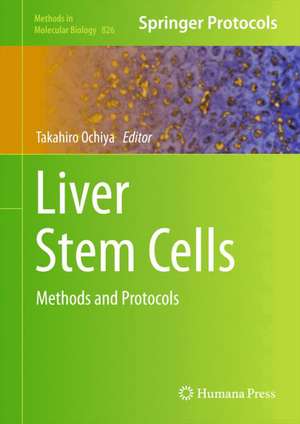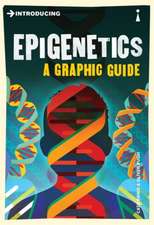Liver Stem Cells: Methods and Protocols: Methods in Molecular Biology, cartea 826
Editat de Takahiro Ochiyaen Limba Engleză Hardback – 14 dec 2011
Thorough and intuitive, Liver Stem Cells: Methods and Protocols seeks to aid scientists in the further study of preclinical and clinical investigations that explore the therapeutic potential of stem cells in repair of liver injuries.
| Toate formatele și edițiile | Preț | Express |
|---|---|---|
| Paperback (1) | 775.74 lei 6-8 săpt. | |
| Humana Press Inc. – 23 aug 2016 | 775.74 lei 6-8 săpt. | |
| Hardback (1) | 646.62 lei 6-8 săpt. | |
| Humana Press Inc. – 14 dec 2011 | 646.62 lei 6-8 săpt. |
Din seria Methods in Molecular Biology
- 9%
 Preț: 791.63 lei
Preț: 791.63 lei - 23%
 Preț: 598.58 lei
Preț: 598.58 lei - 20%
 Preț: 882.98 lei
Preț: 882.98 lei -
 Preț: 252.05 lei
Preț: 252.05 lei - 5%
 Preț: 802.70 lei
Preț: 802.70 lei - 5%
 Preț: 729.61 lei
Preț: 729.61 lei - 5%
 Preț: 731.43 lei
Preț: 731.43 lei - 5%
 Preț: 741.30 lei
Preț: 741.30 lei - 5%
 Preț: 747.16 lei
Preț: 747.16 lei - 15%
 Preț: 663.45 lei
Preț: 663.45 lei - 18%
 Preț: 1025.34 lei
Preț: 1025.34 lei - 5%
 Preț: 734.57 lei
Preț: 734.57 lei - 18%
 Preț: 914.20 lei
Preț: 914.20 lei - 15%
 Preț: 664.61 lei
Preț: 664.61 lei - 15%
 Preț: 654.12 lei
Preț: 654.12 lei - 18%
 Preț: 1414.74 lei
Preț: 1414.74 lei - 5%
 Preț: 742.60 lei
Preț: 742.60 lei - 20%
 Preț: 821.65 lei
Preț: 821.65 lei - 18%
 Preț: 972.30 lei
Preț: 972.30 lei - 15%
 Preț: 660.49 lei
Preț: 660.49 lei - 5%
 Preț: 738.41 lei
Preț: 738.41 lei - 18%
 Preț: 984.92 lei
Preț: 984.92 lei - 5%
 Preț: 733.29 lei
Preț: 733.29 lei -
 Preț: 392.60 lei
Preț: 392.60 lei - 5%
 Preț: 746.26 lei
Preț: 746.26 lei - 18%
 Preț: 962.66 lei
Preț: 962.66 lei - 23%
 Preț: 860.22 lei
Preț: 860.22 lei - 15%
 Preț: 652.64 lei
Preț: 652.64 lei - 5%
 Preț: 1055.50 lei
Preț: 1055.50 lei - 23%
 Preț: 883.87 lei
Preț: 883.87 lei - 19%
 Preț: 491.89 lei
Preț: 491.89 lei - 5%
 Preț: 1038.86 lei
Preț: 1038.86 lei - 5%
 Preț: 524.16 lei
Preț: 524.16 lei - 18%
 Preț: 2122.34 lei
Preț: 2122.34 lei - 5%
 Preț: 1299.23 lei
Preț: 1299.23 lei - 5%
 Preț: 1339.12 lei
Preț: 1339.12 lei - 18%
 Preț: 1390.26 lei
Preț: 1390.26 lei - 18%
 Preț: 1395.63 lei
Preț: 1395.63 lei - 18%
 Preț: 1129.65 lei
Preț: 1129.65 lei - 18%
 Preț: 1408.26 lei
Preț: 1408.26 lei - 18%
 Preț: 1124.92 lei
Preț: 1124.92 lei - 18%
 Preț: 966.27 lei
Preț: 966.27 lei - 5%
 Preț: 1299.99 lei
Preț: 1299.99 lei - 5%
 Preț: 1108.51 lei
Preț: 1108.51 lei - 5%
 Preț: 983.76 lei
Preț: 983.76 lei - 5%
 Preț: 728.16 lei
Preț: 728.16 lei - 18%
 Preț: 1118.62 lei
Preț: 1118.62 lei - 18%
 Preț: 955.25 lei
Preț: 955.25 lei - 5%
 Preț: 1035.62 lei
Preț: 1035.62 lei - 18%
 Preț: 1400.35 lei
Preț: 1400.35 lei
Preț: 646.62 lei
Preț vechi: 760.73 lei
-15% Nou
Puncte Express: 970
Preț estimativ în valută:
123.72€ • 129.19$ • 102.17£
123.72€ • 129.19$ • 102.17£
Carte tipărită la comandă
Livrare economică 16-30 aprilie
Preluare comenzi: 021 569.72.76
Specificații
ISBN-13: 9781617794674
ISBN-10: 1617794678
Pagini: 225
Ilustrații: X, 226 p.
Dimensiuni: 178 x 254 x 20 mm
Greutate: 0.59 kg
Ediția:2012
Editura: Humana Press Inc.
Colecția Humana
Seria Methods in Molecular Biology
Locul publicării:Totowa, NJ, United States
ISBN-10: 1617794678
Pagini: 225
Ilustrații: X, 226 p.
Dimensiuni: 178 x 254 x 20 mm
Greutate: 0.59 kg
Ediția:2012
Editura: Humana Press Inc.
Colecția Humana
Seria Methods in Molecular Biology
Locul publicării:Totowa, NJ, United States
Public țintă
Professional/practitionerCuprins
Purification and Culture of Fetal Mouse Hepatoblasts that are Precursors of Mature Hepatocytes and Biliary Epithelial Cells.-Clinical Uses of Liver Stem Cells.-Identification and Isolation of Adult Liver Stem/Progenitor Cells.-Isolation and Purification Method of Mouse Fetal Hepatoblasts.-Isolation of Hepatic Progenitor Cells from the Galactosamine-Treated Rat Liver.-Purification of Adipose Tissue Mesenchymal Stem cells (AT-MSC) and Differentiation Towards Hepatic-Like Cells.-Development of Immortalized Hepatocyte-like Cell from hMSC.-Isolation of Adult Human Pluripotent Stem Cells from Mesenchymal Cell Populations and their Application to Liver Damages.-Generation and Hepatic Differentiation of Human iPS Cells.-Efficient Hepatic Differentiation from Human iPS cells by Gene Transfer.-“Tet-On” System Toward Hepatic Differentiation of Human Mesenchymal Stem Cells by Hepatocyte Nuclear Factor.-SAMe and HuR in Liver Physiology Usefulness of Stem Cells in Hepatic Differentiation Research.-Transdifferentiation of Mature Hepatocytes into Bile Duct Cells within a Collagen Gel Matrix.-Identification of Cancer Stem Cell-Related MicroRNAs in Hepatocellular Carcinoma.-Intravenous Human Mesenchymal Stem Cells (MSC) Transplantation in NOD/SCID Mice Preserve Liver Integrity of Irradiation Damage.-Engineering of Implantable Liver Tissues.-Mesenchymal Stem Cell Therapy on Murine Model of Non-Alcoholic Steatohepatitis.
Recenzii
From the reviews:
“The brief and concise preface written by Prof. Takahiro Ochiya is particularly well addressed to scholars belonging to different scientific fields: cellular and molecular biology, liver and cancer biology, tissue engineering and stem cell therapy. … This book is properly arriving on the desks of those interested in the biology of this organ that already from the Greeks times, as the myth of Prometheus revealed, possess a very high proliferative capacity (after an injury).” (CarloAlberto Redi, European Journal of Histochemistry, Vol. 57, 2013)
“The brief and concise preface written by Prof. Takahiro Ochiya is particularly well addressed to scholars belonging to different scientific fields: cellular and molecular biology, liver and cancer biology, tissue engineering and stem cell therapy. … This book is properly arriving on the desks of those interested in the biology of this organ that already from the Greeks times, as the myth of Prometheus revealed, possess a very high proliferative capacity (after an injury).” (CarloAlberto Redi, European Journal of Histochemistry, Vol. 57, 2013)
Textul de pe ultima copertă
Increasing evidence suggests that liver stem cells have the capacity to differentiate into parenchymal hepatocytes or into bile ductular cells. These stem cells may be activated to proliferate after severe liver injury or exposure to hepatocarcinogens. Stem cell replacement strategies are being investigated as an alternative approach to liver repair and regeneration. Additionally, stem cell transplantation has been shown to significantly improve liver function and increase survival in experimentally-induced liver-injury models in animals. In Liver Stem Cells: Methods and Protocols, expert researchers focus on several hepatic progenitor cells, hepatic differentiation form stem cells, bile ductal cell formation from stem cells, liver stem cells and hepatocarcinogenesi, and application of liver stem cells for cell therapy. These topics shed light on stem cell technology which may lead to the development of effective clinical modalities for human liver diseases. Written in the highly successful Methods in Molecular Biology™ series format, chapters include introductions to their respective topics, lists of the necessary materials and reagents, step-by-step, readily reproducible laboratory protocols, and key tips on troubleshooting and avoiding known pitfalls.
Thorough and intuitive, Liver Stem Cells: Methods and Protocols seeks to aid scientists in the further study of preclinical and clinical investigations that explore the therapeutic potential of stem cells in repair of liver injuries.
Thorough and intuitive, Liver Stem Cells: Methods and Protocols seeks to aid scientists in the further study of preclinical and clinical investigations that explore the therapeutic potential of stem cells in repair of liver injuries.
Caracteristici
Includes topics that shed light on stem cell technology, leading to the development of effective clinical modalities for human liver diseases Provides step-by-step detail essential for reproducible results Contains key notes and implementation advice from the experts








